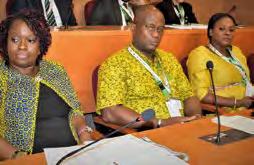12
GENDER DIVERSITY WITHIN AFI MEMBER INSTITUTIONS
AFI MEMBER BEST PRACTICES: DRIVING GENDER DIVERSITY WITHIN INSTITUTIONS In recognition of these barriers, several AFI members have taken action to increase gender diversity within their respective institutions. This section provides insights into their initiatives with a view to highlight the best practices of regulatory institutions in moving forward to drive institutional gender diversity, in consideration of social and cultural barriers. SURINAME
FRENCH GUIANA
SOLOMON ISLANDS Central Bank of the Solomon Islands has taken actions to increase gender diversity by setting targets for i) promotion and recruitment and ii) training and coaching. This has led to the number of women represented in leadership positions to increase by five in 2015. In 2018, the Bank seeks to build on this success and gain increasing momentum through the implementation of merit-based women-targeted hiring practices, to meet the target of 15 women professionals in core departments. This is driven by a manifest high-level commitment from the Governor, who as the Chairman of the Financial Inclusion Committee is a Gender Champion and effected institutional change, particularly in ensuring a Human Resources Policy that actively targets high-potential female candidates. The policies are implemented through a specially allocated budget and trainings provided at all levels. LEBANON
PALESTINE ISRAEL
FIJI
BRAZIL The Banco Central do Brazil through its women leadership training, annual gender equality events (such as International Women’s Day), and lectures aims to improve relationships amongst its staff by eliminating discrimination against women. These programs also help female staff strike a balance between their professional growth and personal aspirations, as well as manage sexism in the workplace. The Corporate University UniBC, a department within the Banco Central do Brazil itself, provides the training and lectures. Furthermore, the bank’s recruitment policy, which includes a written test, guarantees total anonymity through a “number” allotted to each applicant, thereby ensuring fair treatment to all candidates regardless of their gender. To build the talent pipeline, the Human Resource Advisor empowers highpotential staff with the required competency for leadership positions, regardless of their gender, sexual orientation, or ethnicity. For the last five years, the Bank has been monitoring the percentage of women in both leadership and entry-level positions, which currently stands at 24% and 23% respectively. This reflects its ability to sustain a compatible number of women employees at both levels. To further accelerate gender diversity, the Bank’s Board encourages discussions on gender diversity issues and the right approach to implement smart policies to create a more conducive workplace for everyone.
Reserve Bank of Fiji has a “Recruitment and Selection Policy” which provides equal employment opportunities to all applicants, irrespective of their sex. The Bank advocates for gender diversity and encourages the inclusion of women in the public workforce. In 2017, the Bank advocated the need for greater women representation on the boards of listed companies through an official press release, thereby sending out a policy signal to the wider financial sector, which resulted in a conscious effort on the part of companies to appoint women board directors. As of 2017, seven out of the 19 listed companies have female board directors. In terms of composition, 13 out of 106 board directors in the listed companies are women.





